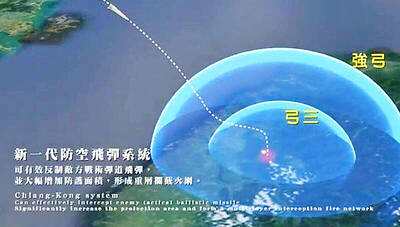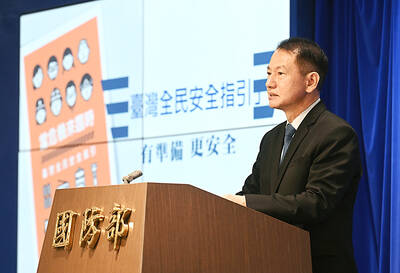Holiday cheer was but a ghost of Christmas past in Bethlehem, where only a handful of pilgrims braved weeks of warfare in the Holy Land to visit the biblical birthplace of Jesus yesterday.
"There is no singing, no Christmas lights, no Christmas decorations," lamented Theresa Dalmau, 46, of Puerto Rico. "It's Christmas because we know it's Christmas, not because you can feel it. They are mourning their dead and wounded."
Only about 200 people were on hand in a windswept and rainy Manger Square for the arrival from Jerusalem of an annual procession headed by Michel Sabbah, Latin Patriarch of the Holy Land, who will celebrate Midnight Mass.
A rainbow formed an arch above the square, adding a splash of color to the gloomy atmosphere pervading the West Bank town.
At least 343 people, all Palestinians except for 13 Israeli Arabs and 39 other Israelis, have been killed in almost three months of violence that have also claimed Christmas spirit as a casualty.
The Christmas lights of Bethlehem once shone like a bright star, guiding the way for thousands of visitors at a time when Israeli-Palestinian peace seemed to be on the horizon.
Wise men and women now steer clear of the area, the scene of frequent Israeli-Palestinian clashes.
But in a morale-boosting holiday visit, Palestinian President Yasser Arafat flew into town by helicopter to attend, as he does annually, Midnight Mass in Saint Catherine's Church off Manger Square.
It was his first visit to the West Bank since the Palestinian uprising against Israeli occupation erupted on Sept. 28.
Israeli army checkpoints regulate access to Palestinian-ruled Bethlehem.
The military said the roadblocks would be open for the holiday "only as far as the security situation allows."
Bethlehem Mayor Hanna Nasser said Christmas festivities would be confined to religious ceremonies, including Midnight Mass, and childrens' festivals and choirs.
"It's a sad Christmas this year because of the absence of peace in the city of peace and joy," he said.
Many souvenir shops remained shuttered and hotels were largely empty except for a handful of tourists.
The Christmas tree in Manger Square, adorned with plain lights this year, was a pale imitation of the colorfully lit arbor that once provided the background for countless holiday snapshots.
"Tourism? There is nothing. Business? There is nothing," said Joseph Giacaman, who owns a souvenir store on the square.
"For almost two months we haven't seen anybody," he said. "This is the worst business has been in 20 to 25 years. Nobody feels that this is a holiday."

LIMITS: While China increases military pressure on Taiwan and expands its use of cognitive warfare, it is unwilling to target tech supply chains, the report said US and Taiwan military officials have warned that the Chinese People’s Liberation Army (PLA) could implement a blockade within “a matter of hours” and need only “minimal conversion time” prior to an attack on Taiwan, a report released on Tuesday by the US Senate’s China Economic and Security Review Commission said. “While there is no indication that China is planning an imminent attack, the United States and its allies and partners can no longer assume that a Taiwan contingency is a distant possibility for which they would have ample time to prepare,” it said. The commission made the comments in its annual

DETERMINATION: Beijing’s actions toward Tokyo have drawn international attention, but would likely bolster regional coordination and defense networks, the report said Japanese Prime Minister Sanae Takaichi’s administration is likely to prioritize security reforms and deterrence in the face of recent “hybrid” threats from China, the National Security Bureau (NSB) said. The bureau made the assessment in a written report to the Legislative Yuan ahead of an oral report and questions-and-answers session at the legislature’s Foreign Affairs and National Defense Committee tomorrow. The key points of Japan’s security reforms would be to reinforce security cooperation with the US, including enhancing defense deployment in the first island chain, pushing forward the integrated command and operations of the Japan Self-Defense Forces and US Forces Japan, as

INTERCEPTION: The 30km test ceiling shows that the CSIST is capable of producing missiles that could stop inbound missiles as they re-enter the atmosphere Recent missile tests by the Chungshan Institute of Science and Technology (CSIST) show that Taiwan’s missiles are capable of intercepting ballistic missiles as they re-enter the atmosphere and pose a significant deterrent to Chinese missile threats, former Hsiung Feng III missile development project chief engineer Chang Cheng (張誠) said yesterday. The military-affiliated institute has been conducting missile tests, believed to be related to Project Chiang Kung (強弓) at Pingtung County’s Jiupeng Military Base, with many tests deviating from past practices of setting restriction zones at “unlimited” and instead clearly stating a 30.48km range, Chang said. “Unlimited” restrictions zones for missile tests is

PUBLIC SAFETY: The nationwide distribution campaign aims to enhance society’s overall understanding of threats and bolster defense awareness, an official said The latest edition of the National Public Safety Guide is being mailed to all citizens starting today to foster public awareness of self-defense in the event of war or natural disasters, the Ministry of National Defense said yesterday. “The guides will be disseminated to the public to enhance society’s overall understanding of threats and bolster defense awareness, demonstrating the government’s emphasis on people’s safety and its determination to pursue self-defense,” All-out Defense Mobilization Agency Director Shen Wei-chih (沈威志) said at the ministry’s news conference. The nationwide distribution campaign was planned according to President Lai William’s (賴清德) Sept. 20 directive, he said, adding